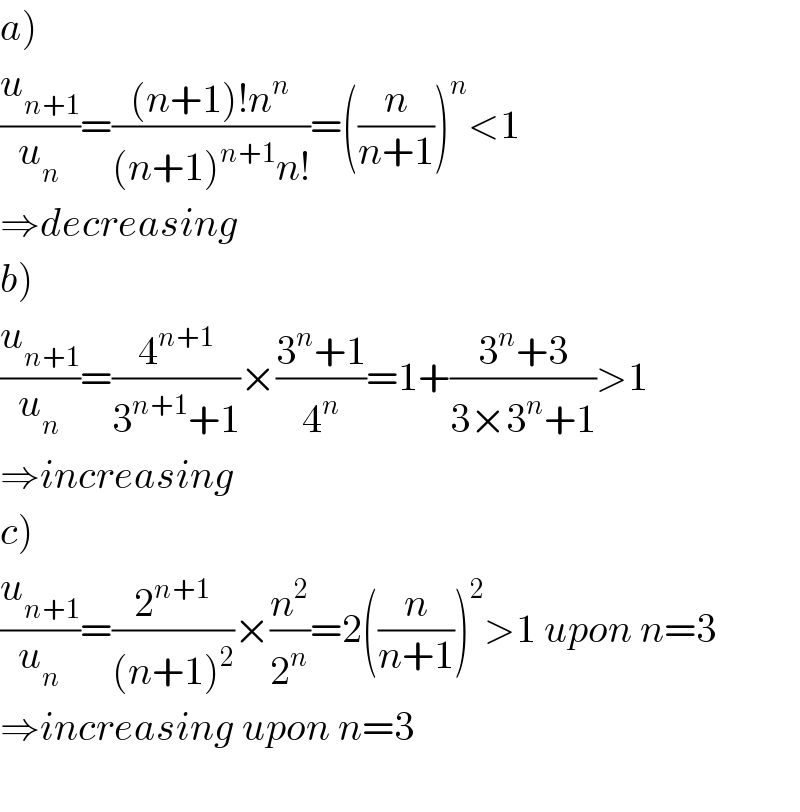Question Number 78569 by Rio Michael last updated on 18/Jan/20

$${which}\:{of}\:{the}\:{following}\:{is}\:{increasing}\:{or}\:{decreasing} \\ $$$${a}.\:\:{u}_{{n}} \:=\:\frac{{n}!}{{n}^{{n}} } \\ $$$${b}.\:\:{u}_{{n}} =\:\frac{\mathrm{4}^{{n}} }{\mathrm{3}^{{n}} +\mathrm{1}} \\ $$$${c}.\:{u}_{{n}} =\:\frac{\mathrm{2}^{{n}} }{{n}^{\mathrm{2}} } \\ $$
Answered by mr W last updated on 18/Jan/20

$$\left.{a}\right) \\ $$$$\frac{{u}_{{n}+\mathrm{1}} }{{u}_{{n}} }=\frac{\left({n}+\mathrm{1}\right)!{n}^{{n}} }{\left({n}+\mathrm{1}\right)^{{n}+\mathrm{1}} {n}!}=\left(\frac{{n}}{{n}+\mathrm{1}}\right)^{{n}} <\mathrm{1} \\ $$$$\Rightarrow{decreasing} \\ $$$$\left.{b}\right) \\ $$$$\frac{{u}_{{n}+\mathrm{1}} }{{u}_{{n}} }=\frac{\mathrm{4}^{{n}+\mathrm{1}} }{\mathrm{3}^{{n}+\mathrm{1}} +\mathrm{1}}×\frac{\mathrm{3}^{{n}} +\mathrm{1}}{\mathrm{4}^{{n}} }=\mathrm{1}+\frac{\mathrm{3}^{{n}} +\mathrm{3}}{\mathrm{3}×\mathrm{3}^{{n}} +\mathrm{1}}>\mathrm{1} \\ $$$$\Rightarrow{increasing} \\ $$$$\left.{c}\right) \\ $$$$\frac{{u}_{{n}+\mathrm{1}} }{{u}_{{n}} }=\frac{\mathrm{2}^{{n}+\mathrm{1}} }{\left({n}+\mathrm{1}\right)^{\mathrm{2}} }×\frac{{n}^{\mathrm{2}} }{\mathrm{2}^{{n}} }=\mathrm{2}\left(\frac{{n}}{{n}+\mathrm{1}}\right)^{\mathrm{2}} >\mathrm{1}\:{upon}\:{n}=\mathrm{3} \\ $$$$\Rightarrow{increasing}\:{upon}\:{n}=\mathrm{3} \\ $$$$ \\ $$
Commented by Rio Michael last updated on 19/Jan/20

$${thanks}\:{sir} \\ $$
